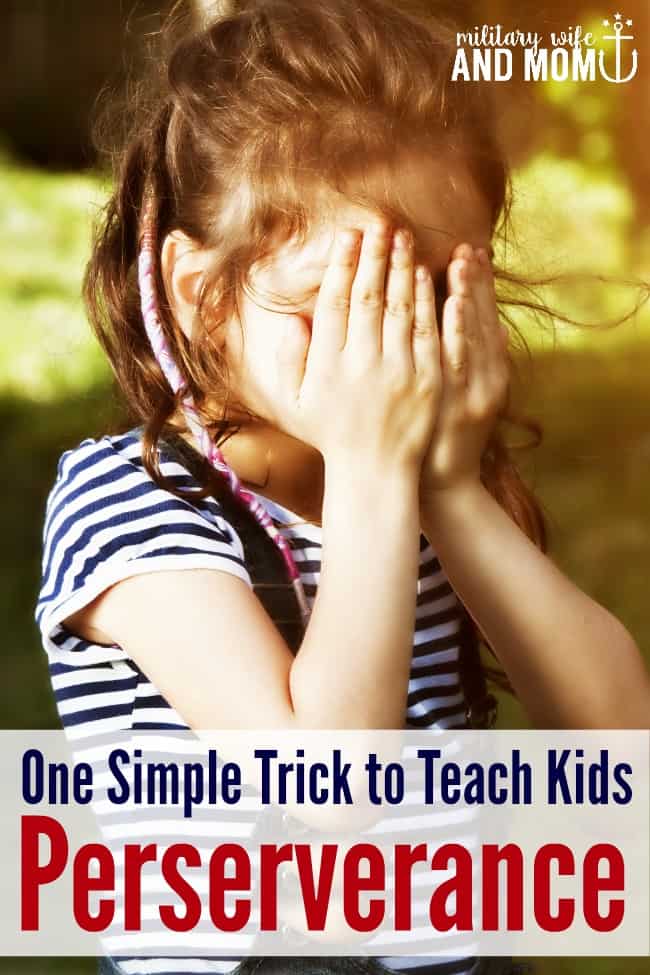When I was a little girl growing up in the Midwest, my dad and I spent most evenings playing Trivial Pursuit for Kids at the kitchen table. I didn’t realize it at the time, but I was in the midst of a life lesson called teaching perseverance to kids.
Each night, I desperately wanted to fill my colored trivial pursuit pie before my dad.
I wanted to win.
While the trivia questions in the kids’ version were far easier than the adult version, they were still hard. Especially for a 7 year-old.

Post contains affiliate links, see my disclosure here.
Night after night, I would lose in trivial pursuit, and my dad would win. I mean, of course he won. He knew far more answers to the trivia questions as an adult than I did as a 7 year-old child.
But my dad never let me win.
I lost.
I lost.
I lost again.
I cried each time I lost. It was devastating to me to lose again and again each night. I experienced struggle, disappointment, and failure.
Little did I know my dad was teaching me 3 great parenting lessons—hope, tenacity, and perseverance.
Teaching perseverance to kids.
When we see our children hurting, our gut reaction as parents is to fix it. To make it better. To kiss the boo-boo and make the pain go away.
That’s what parents do, right?
When my dad saw me struggling with trivial pursuit, he could’ve intervened. He could’ve fixed it by letting me win. He could’ve made all my feelings of failure and struggle and disappointment disappear by simply losing on purpose.
But he didn’t.
Here’s why.
When we allow our children to fail – and offer an opportunity to try again – we do three very important things:
–We cultivate perseverance.
–We cultivate tenacity.
–We cultivate hope.
When we allow our kids to fail, we teach them to persist despite difficulty or delay in success. Perseverance is all about working hard despite disappointment or failure. It teaches us to keep trying even if takes days, months or years to succeed.
Furthermore, when we allow our kids to fail, we teach them how learn an idea or concept firmly. Tenacity is all about teaching your child to keep trying until they reach their goal. If my dad would’ve let me win the game, I never would’ve learned how to play, answer the questions, and conquer the game.
In fact, I never would’ve learned to experience hope. So just as we need to teach our kids to be kind and thoughtful towards others, we must teach our children how to persevere.
Hope is a function of struggle.
That is a quote from parenting great Brene Brown; “Hope is a function of struggle.”
What does that mean?
When we don’t allow our children to experience struggle, failure and disappointment, we take away their hope. The hope that there is always a chance to overcome a struggle. The hope that when you fail, you can try again and succeed. The hope that when you feel disappointed, there is always a chance to experience success.

Did I ever win?
My dad and I were again sitting at the kitchen table on a Saturday evening playing trivial pursuit. I experienced months of loss and tears over this ridiculous game. Now as a thirty-something mom-of-two, this remains one of my most vivid childhood memories.
I lost.
I lost.
I lost.
I lost.
I lost.
.
.
.
I won.
We played again; I won.
I remember that day that I won. It was as if the stormy clouds in the sky separated to reveal a crystal clear blue sky with the sun shining down. I’ll never forget the emotions I felt—exhilaration, victory, success, happiness, joy, pride, and hope.
In that moment, I felt that I could do anything. I felt that no matter what happened in life there was always a chance for success. There was always hope.
Another story for you.
Allowing our kids to mess up, fall down or fail is the hardest thing in the world. It’s especially hard when you see it coming from a mile away.
Several times a week, I take my son to park near our apartment building. And at the park there is a kids’ rock wall that most older kids can conquer with ease.
Each day my son would carefully watch all the children climbing the rock wall. And each day he wanted to try too. And each day he couldn’t quite make it up.
His foot would slip.
Or he would get too far up and feel scared.
Or the distance between rock footings was too far apart for his legs.
He would get so mad and angry. He would cry. I would encourage and comfort him, but I didn’t carry him up the rock wall. I let him find his own way.
One day, we headed back out to the park. I knew he was going to try again at the rock wall. He started climbing, and for a moment, I thought he would make it.
Then his left foot slipped off the wall.
I held my breath for a second, waiting to see if he would recover.
With his hands firmly gripping the rocks, he regained traction with his foot. Slowly but surely, he diligently climbed to the top, turned around, and gave me the biggest smile. His cheeks filled so full with excitement, they looked as if they could burst at any moment.
Our eyes met. I saw three things:
Perseverance.
Tenacity.
Hope.
Print this free listening checklist.
This post comes with a free printable checklist to help with listening. I always have the hardest time remembering these phrases. This printable simplifies it!
Here is a sneak preview…
Download Your Free Printable
- Download the checklist. You’ll get the printable, plus join 37,000+ parents who receive my weekly parenting tips and ideas!
- Print. Any paper will do the trick, but card stock
would be ideal.
- Place it on your refrigerator. Check things off as you go and don’t forget a thing!
Want more on parenting?
- 4 Year Old Not Listening? How to Ditch Defiance and Gain Cooperation
- 7 Reasons Why You’re Dealing With Toddler Whining (And How to Fix It)
- 2 Year Old Not Listening? Try This Remarkable Tip
- The Most Overlooked Reason Why Kids Won’t Listen, Focus or Sit Still
- Best Visual Routines for Toddlers to Follow Directions Without Reminders
I've created a free email series just for you! If you are struggling with teaching your child to listen, this series will help transform your parenting. Yes, really. I've seen my proven strategies work time and time again for parents. I know it can work for you too.
After taking my free email series, you will:
- Learn simple, yet highly effective listening strategies
- Experience a stronger connection with your child
- Enjoy more peaceful parenting days
- Gain more cooperation from your child














Perseverance and tenacity I almost expected you to say; but I love how you said these hard lessons help children to develop the virtue of hope. Hope is so important, especially as we get older and we face adult challenges. Hope is the grounding for perseverance and tenacity. It’s what guides our aim and keeps the light ahead of us.
You are exactly right. Hope is grounds us, guiding our aim and pushing us forward. They all work hand in hand. Thanks for stopping by again.
Hi, I found your blog while looking for resources to help my daughter develop more tenacity. I agree that letting our children fail and enjoy the fruits of their labor and feel that accomplishment is great. My kiddo quits hard tasks. Games, sports, academics – she will quit rather than persevere. If she doesn’t get a quick win she fast loses interest. When she is motivated it’s great. For some reason you were motivated to keep trying to win at Trivial Pursuit, kudos to you! My kiddo ceases to engage. As a kid myself, it was Monopoly. I kept at it and I finally won. My child moves on to the next thing that interests her. I would love to know what keeps some of us at that table, trying again and again rather than out rightly refusing to play after enduring a few losses. I think your experience is good, but based on my own experience I think your story demonstrates the tenacity you already had that enabled you to delay gratification.
I completely agree with what you have written. I hope this post could reach more people as this was truly an interesting post.